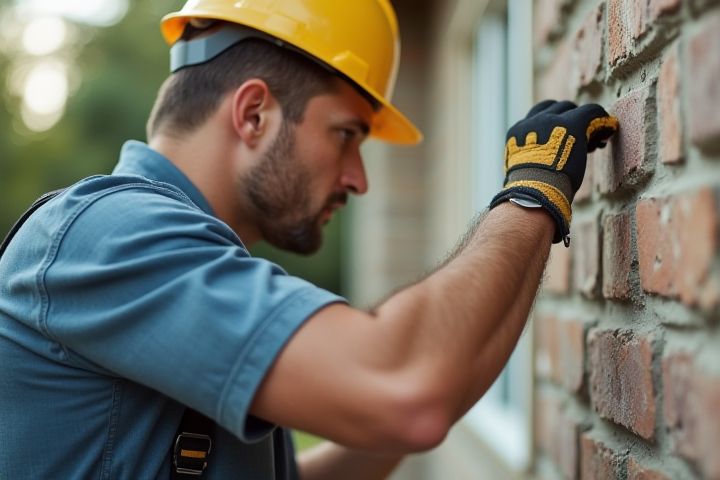
Before purchasing a house, conduct a thorough inspection of its structural integrity, including the foundation, roof, and walls. Check for signs of water damage, mold, or pest infestations in the basement and attic, as these can indicate serious underlying issues. Assess the condition of major systems such as plumbing, electrical, and HVAC to ensure they meet safety standards and function properly. Evaluate the neighborhood's safety, amenities, and property values to gauge long-term investment potential. Lastly, scrutinize the property's title and any liens to avoid legal complications post-purchase.
What To Inspect Before Buying A House
Foundation and structural integrity
Inspecting the foundation and structural integrity of a house is crucial for ensuring long-term stability and safety. Look for visible cracks in the foundation walls, which can indicate shifting soil or water damage, and measure their width; cracks wider than 1/4 inch may require further evaluation. Additionally, check for any signs of sagging or uneven floors, which can suggest issues with the foundational support or framing. You should also examine the roof for any signs of water leakage or structural damage, as this can compromise the overall integrity of the home.
Roof condition
Inspecting the roof's condition is critical before purchasing a house, as it significantly impacts overall property value and safety. Look for visible signs of damage, such as missing or curling shingles, leaks, or sagging areas, which can indicate underlying issues. The average lifespan of a shingles roof is typically 20-30 years, so verify the age and material to assess potential replacement costs. You may also consider hiring a professional inspector to evaluate roof drainage systems, flashings, and ventilation, ensuring you make an informed decision about your investment.
Electrical systems
Before purchasing a house, it is crucial to assess the electrical systems, ensuring they meet safety and functionality standards. Check for updated electrical panels; a modern panel typically has a capacity of 100-200 amps. Inspect wiring for signs of deterioration or outdated materials, such as knob-and-tube wiring, as this may require costly upgrades. Additionally, verify the presence of Ground Fault Circuit Interrupters (GFCIs) in wet areas like kitchens and bathrooms, as they are essential for preventing electrical shocks.
Plumbing systems
Before purchasing a house, it's crucial to inspect the plumbing system thoroughly. Check for signs of water damage, such as stains or mold, which can indicate leaks in pipes. Examine the water pressure; a consistent flow of 40 to 60 psi is ideal for home water systems. Lastly, ensure that all fixtures, including sinks, toilets, and showers, function correctly and look out for corrosion or rust in exposed pipes.
Heating, ventilation, and air conditioning
Inspect the heating, ventilation, and air conditioning (HVAC) system to ensure efficient performance and longevity; a properly functioning HVAC system can increase energy efficiency by up to 30%. Check for age and maintenance records; a well-maintained system typically lasts 15-20 years but may require replacement sooner if neglected. Assess the ductwork for any signs of leaks, mold, or inadequate airflow, which can lead to indoor air quality issues and increased utility bills. Finally, verify thermostat functionality and the presence of any warranties that could save you on future repairs or replacements.
Water damage or mold
Before purchasing a home, thoroughly inspect for water damage, as it can lead to costly repairs and health risks. Check for visible signs such as stains on ceilings, walls, or floors, which may indicate previous leaks. Evaluate areas around windows, doors, and plumbing fixtures for mold growth, which thrives in damp conditions; a musty odor often accompanies it. Be aware that homes in flood-prone areas are at a higher risk for water damage, making it essential to review historical flood data and inspection reports when considering a property.
Insulation and energy efficiency
Before purchasing a house, it's essential to inspect insulation and energy efficiency thoroughly. Check the type of insulation used in the walls, attic, and basement; high-quality materials such as spray foam or fiberglass batt can significantly affect energy costs. Look for the home's Energy Star rating, which indicates how well it minimizes energy consumption--homes with this certification can save you over $400 annually on utility bills. Finally, evaluate windows for energy efficiency; double or triple-pane glass can reduce heat exchange, enhancing comfort and lowering heating and cooling expenses.
Pest infestations
Inspecting for pest infestations is crucial when considering a home purchase. Look for signs of rodents, such as droppings or gnaw marks, particularly in attics and basements. Termites can cause significant structural damage, so check for mud tubes, hollowed wood, or frass in wooden structures. You may also want to evaluate crawl spaces and foundation areas to discover any moisture problems that could attract pests, safeguarding your investment from future infestations.
Property boundaries and land condition
Before purchasing a home, it's crucial to verify the property's boundaries, typically defined by survey markers or property lines to avoid disputes with neighbors. Inspect the land condition, including drainage systems and soil stability, as these factors can significantly impact future renovations or landscaping projects. You should also check for potential hazards such as flood zones or erosion-prone areas, which may affect the long-term value of your investment. Ensuring that the property conforms to local zoning laws will help safeguard your plans for any modifications or expansions.
Local zoning and building codes compliance
Before purchasing a house, it's crucial to verify compliance with local zoning and building codes, as these regulations affect property usage and safety. Check if the property is zoned for your intended use, whether residential, commercial, or mixed-use, to avoid future legal issues. Investigate any recent code violations or ongoing issues that could lead to additional expenses or renovation requirements. Understanding the zoning regulations can also reveal potential for property value appreciation, especially if there are plans for nearby developments.
